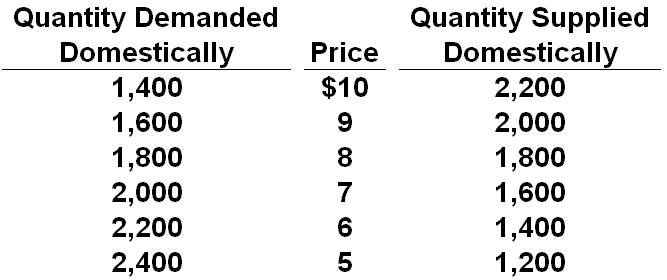Refer to the table below for a certain product's market in Econland. If Econland were entirely closed to international trade, the equilibrium price and quantity would be:

A. $9 and 2,000 units
B. $8 and 1,800 units
C. $7 and 2,000 units
D. $6 and 1,400 units
B. $8 and 1,800 units
You might also like to view...
Your neighbor likes to blast 1970's rock music and the louder the better. The loud music imposes a cost on you because it disrupts your study of economics. Let D stand for the volume of his music in decibels, B for his benefits and C for your costs, where B and C are measured in dollars. For any given volume, D, your neighbor's benefit is B = 0.63D - 0.002D2 and your cost is C = 0.06D + 0.001D2. What is the efficient Pigouvian tax?
A. $0.75 per decibel B. $0.29 per decibel C. $0.24 per decibel D. $0.25 per decibel
In a quasi-experiment
A) quasi differences are used, i.e., instead of ?Y you need to use ( - λ × ), where 0 < λ < 1. B) randomness is introduced by variations in individual circumstances that make it appear as if the treatment is randomly assigned. C) the causal effect has to be estimated through quasi maximum likelihood estimation. D) the t-statistic is no longer normally distributed in large samples.
Congress relies on economists at the Congressional Budget Office to
a. enforce the nation's antitrust laws. b. set the nation's monetary policy. c. provide evidence that incumbent members of Congress are performing well in their jobs. d. provide independent evaluations of policy proposals.
Javier goes to an all-you-can-eat buffet at a Chinese restaurant and consumes three plates of food. Which of the following explains why the third plate of food does not provide as much satisfaction as the second plate?
A. The law of expanding externalities. B. The rule of total utility. C. The law of supply. D. The law of diminishing marginal utility.